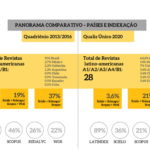José Carlos de Carvalho Leite, Master in Health and Human Development Universidade La Salle, Porto Alegre, RS, Brazil
 Drop-out from treatment for alcohol-related problems remains public health challenge internationally. A recent study, published this week in Brazil, shows that heath-service users’ own belief in the ability to overcome the daily challenges of alcohol dependence helps the person to stay in treatment. Such finding is in line with a recent systematic review on this subject (MARKER; NORTON, 2018). The Brazilian study was published in the journal Psychological Studies (Campinas, Vol. 35, No. 4) under the title “Motivation and adherence to psychosocial treatment for alcohol and drug use-related problems”. In this study, researchers from the La Salle University, the Santa Tecla Psychiatric Clinic and the Health Department of Rio Grande do Sul State interviewed 150 men and women living with severe alcohol dependence, starting treatment at a SUS (the Brazilian NHS) Psychosocial Care Centre – Alcohol and drugs (CAPS-AD). At that particular time, health-service users’ motivation to follow the treatment was assessed and after two months, when the researchers checked whether these patients continued to attend or had dropped-out from treatment.
Drop-out from treatment for alcohol-related problems remains public health challenge internationally. A recent study, published this week in Brazil, shows that heath-service users’ own belief in the ability to overcome the daily challenges of alcohol dependence helps the person to stay in treatment. Such finding is in line with a recent systematic review on this subject (MARKER; NORTON, 2018). The Brazilian study was published in the journal Psychological Studies (Campinas, Vol. 35, No. 4) under the title “Motivation and adherence to psychosocial treatment for alcohol and drug use-related problems”. In this study, researchers from the La Salle University, the Santa Tecla Psychiatric Clinic and the Health Department of Rio Grande do Sul State interviewed 150 men and women living with severe alcohol dependence, starting treatment at a SUS (the Brazilian NHS) Psychosocial Care Centre – Alcohol and drugs (CAPS-AD). At that particular time, health-service users’ motivation to follow the treatment was assessed and after two months, when the researchers checked whether these patients continued to attend or had dropped-out from treatment.
The results show that people who believe they will not drink alcohol in difficult situations such as parties, moments of anxiety or sadness, and who consider themselves able to follow the treatment up to the end are more likely to keep on treatment. Lower levels of schooling (primary education only) and low income or no income at all are related to a reduced probability of remaining in treatment.
The study concludes that low motivation is a barrier to providing health care to people with problems related to alcohol use and their families. The motivations to follow the treatment and risk identification related to the alcohol use must be monitored from the beginning of the treatment, as suggested in a similar study conducted in the English Public Health System (NHS-UK) (LEITE et al., 2011). Finally, special attention should be given to both, service users with lower schooling and those with lower income.
References
LEITE, J. C. D. C. et al. The Psychosocial Treatment Expectations Questionnaire (PTEQ) for alcohol problems: Development and early validation. European Journal of Psychological Assessment, v. 27, n. 4, p. 228-236, 2011. e-ISSN: 2151-2426 [reviewed 10 November 2018]. DOI: 10.1027/1015-5759/a000077. Avaliable from: https://econtent.hogrefe.com/doi/10.1027/1015-5759/a000077
MARKER, I. and NORTON, P. J. (2018). The efficacy of incorporating motivational interviewing to cognitive behavior therapy for anxiety disorders: A review and meta-analysis. Clin Psychol Rev., v. 62, p. 1-10, 2018. ISSN: 0272-7358 [reviewed 10 November 2018]. DOI: 10.1016/j.cpr.2018.04.004. Avaliable from: https://www.ncbi.nlm.nih.gov/pubmed/29727863
To read the article, access
LEITE, J. C. C. et al. Motivation and adherence to psychosocial treatment for alcohol and drug use-related problems. Estud. psicol. (Campinas) [online]. 2018, vol.35, n.4, pp.389-398. ISSN 0103-166X. [viewed 13 December 2018]. DOI: 10.1590/1982-02752018000400006. Available from: http://ref.scielo.org/25kg63
External link
Estudos de Psicologia (Campinas) – ESTPSI: www.scielo.br/estpsi
Como citar este post [ISO 690/2010]:













Recent Comments